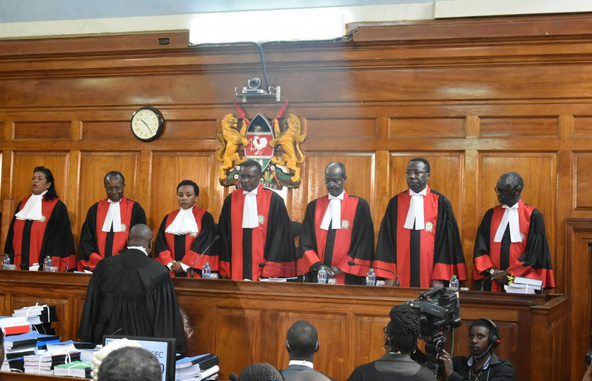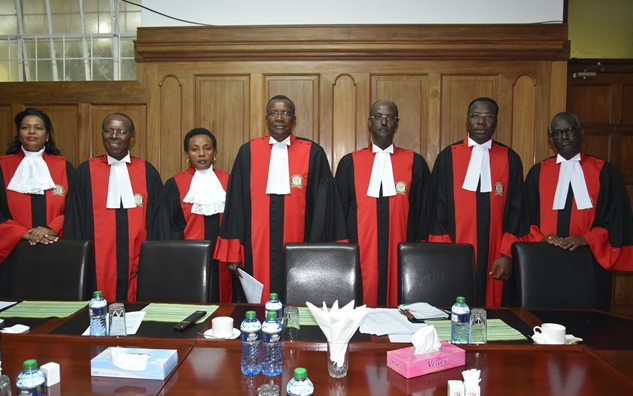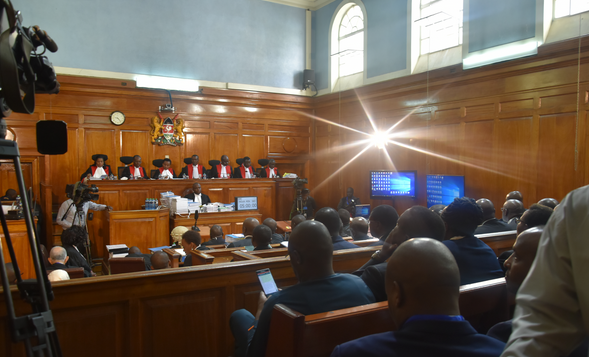Presidential Petition of 2017: Today-Friday, 1st September 2017, the Kenya Supreme court led by chief justice David Maraga will deliver a ruling on the 8th August 2017 presidential elections results dispute between Uhuru Kenyatta and Raila Odinga on whether the Independent Electoral and Boundaries Commission-IEBC) conducted a free and fair elections that would grant the respondent a win. The verdict of the case will determine whether Kenya will be headed to a by election in 6 months as stipulated in law or Uhuru will be sworn as president elect. We will share the full ruling the time it will be read but below is what to expect.
UPDATE: Supreme Court issues order to IEBC Kenya to organize a fresh election within 60 days. Invalidates the re-election of president Uhuru Kenyatta in the 8th August 2017 general elections.

Did IEBC Conduct a free and fair election as stipulated in Constitution of Kenya
Before making a ruling on the case, the supreme court judges will consider the act of the constitution and other supporting laws passed in parliament on whether the August 2017 general election were conducted in a free and fair manner. Whether all voters were given a chance to vote and whether their votes counted. The judges will look at the petitioner (Raila Odinga), the first respondent (Uhuru Kenyatta), second respondent (IEBC) and third respondent (Wafula Chebukati) presentation during the hearing.
Were 2017 general elections conducted in accordance with constitution and supporting Acts
In this case, the Kenyan supreme court judges will look at the process in which the IEBC conducted the 2017 elections in regards to presidential elctions. The electoral law stipulates that “After counting the votes in the polling stations, the IEBC shall tally and verify the count. Within seven days after the presidential election, the chairperson of the Independent Electoral and Boundaries Commission shall declare the result of the election. A candidate shall be declared elected as President if the candidate receives more than half of all the votes cast in the election and at least twenty-five per cent of the votes cast in each of more than half of the counties”

IEBC chair is on the other hand supposed to declare the president by tallying the form 34B(S) from all the constituency and also verify that the the form 34B(s) tally matches with that coming from form 34A(s) arising from the polling stations. Elections Act Art.86(c) of The 2010 Constitution of Kenya provides that at every election, the IEBC shall ensure that the results from the polling stations are openly and accurately collated and promptly announced by the returning officer. It also provides that in a presidential election, after counting the votes in the polling stations, the Independent Electoral and Boundaries Commission shall tally and verify the count and declare the result.The Elections Act provided that before determining and declaring the final results of an election the Commission may announce the provisional results (UPDATE: Act was amended to remove provisional results). The Court held that the results certified by the returning officer for each presidential candidate with regard to that constituency were final and could only be challenged in the Supreme Court in an election petition. Tallying of votes shall thus be effected at the constituency polling station.
Will of the People of Kenya
In making its ruling, the supreme court judges will have to keen interest of the will people or the sovereignty of the people. Any violation during the election process should be able to have affected the numbers. If there were violations committed in the election but did not affect the numbers (total votes), then ( in my opinion) the supreme will nullify the election.

Key Lawyers Who Represented Raila Odinga, Uhuru Kenyatta and IEBC
- James Orengo
- Fred Ngatia
- Paul Muite
- Abdullahi Ahmednasir
- PLO Lumumba
- Otiende Amollo
Live Proceedings
- 11:20 AM: Arrivals of Supreme court Judges
- 11: 23 AM: Introduction of the lawyers involved in the case
- 11:25 AM: Chief Justice Maraga giving introductory remarks on why they will not read the full judgement.
- 11:29 AM: Chief Justice Maraga starts reading determination of the court
[irp]
Do not miss our latest update on today’s Kenyan Supreme Court Ruling on Raila Odinga Vs. Uhuru Kenyatta Presidential Elections Results petition of 2017.
Leave a Comment